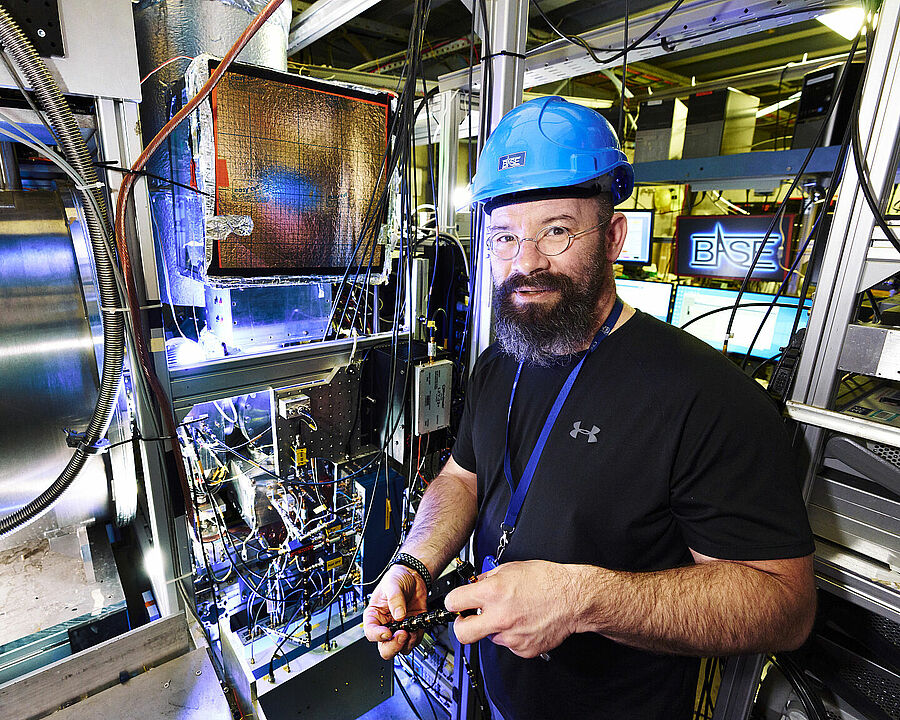A fundamental relationship exists between matter and antimatter: Every particle of matter – from which everything in and around us is made – has an antimatter counterpart. Positrons, for example, are the antiparticles of electrons. Particle-antiparticle pairs are created on Earth from pure kinetic energy in high-energy accelerators and in cosmic radiation; when particles and antiparticles collide, they annihilate each other in a high-energy flash of light and particle avalanches.
One of the most fundamental questions in physics deals with the relationship between these entities, namely whether the fundamental properties of particles and antiparticles are – with the exception of signs – the same or whether there are tiny differences. And highly essential: Why does our universe seemingly consist solely of matter when matter particles are always created in pairs with their antimatter counterparts?
Professor Dr Stefan Ulmer is focusing on the ultra-precise measurement of fundamental antimatter properties. He has developed several novel devices and observation methods to store and investigate antiprotons in so-called Penning traps. He can then use the particles trapped in this way to make spectroscopic high-resolution measurements, including comparison of the charge-to-mass ratio between protons and antiprotons, and the measurement of the magnetic moment of single antiprotons and protons.
From HHU, Professor Ulmer will continue his work within the BASE collaboration, which he founded and established at the European Organisation for Nuclear Research (CERN) in Geneva and at the RIKEN research institution in Japan. These links will make HHU a leading institute within the BASE collaboration, and enable researchers from Düsseldorf to work at CERN in the future.
Ulmer: “I am aiming to expand the research spectrum of my laboratory to conduct fundamental-physics measurements in Düsseldorf. These will include spectroscopic measurements on electrons and positrons as we can generate these light antiparticles here at HHU. To enable us to work with antiprotons in the Rhine region as well – far away from any accelerator centre – we are currently developing the transportable antiproton trap “BASE-STEP”. In the long term, this device could in principle be used to transport antiprotons from Geneva to Düsseldorf.”
The requirements for his laboratory are complex: For example, the rooms must be extremely well shielded against disruptive external magnetic field-fluctuations, which could otherwise disturb the measurement results. Ulmer: “The goal by the latter part of the coming year is to have prepared the infrastructure at HHU to a level where laboratories are available in which we can set up ground-breaking experiments.” This also includes experiments to search for dark matter using highly sensitive superconducting resonators.
About the scientist
Stefan Ulmer (born in Tübingen in 1977) studied physics at the University of Heidelberg, completing his diploma in 2006 and gaining his PhD in 2011 for the “First Observation of Spin Flips with a Single Trapped Proton”. He then worked at the RIKEN research centre in Wako, Japan, and at CERN in Geneva. He was appointed W3 Professor at the Department of Physics at HHU on 7 November.
Professor Ulmer researches fundamental physical symmetries and interactions, such as the relationship between matter/antimatter conjugates. Among other things, he has developed traps for single antiprotons to enable high-precision experiments to be conducted on them. In this context, he is involved in various research collaborations in Japan and Geneva: He founded the BASE collaboration at CERN, is co-initiator and co-director of the “Max Planck, RIKEN, PTB Center for Time, Constants and Fundamental Symmetries” and Chief Scientist at the “Ulmer Fundamental Symmetries Laboratory” at RIKEN. He is also Chair of the Antimatter Physics Community at CERN.
He has published more than 60 academic papers to date, including in journals such as Nature, Physical Review Letters and Science. Among other awards, Ulmer has received the “IUPAP young investigator award 2014 for fundamental metrology” for his contributions to high-precision antiproton spectroscopy. On 8 November he was presented with a „Falling Walls Awards 2022“.


